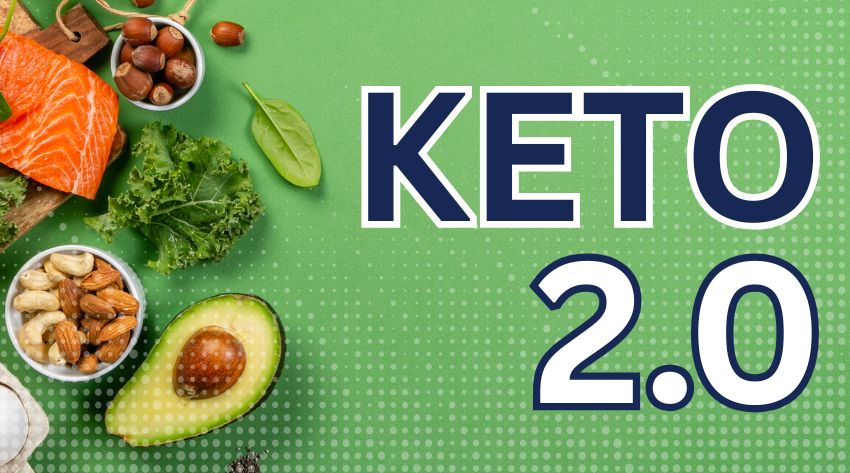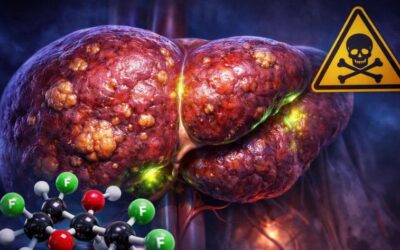You would have heard about the Keto diet– it was the “only” way to lose weight, reverse chronic disease, and more; then you heard that it may backfire with weight loss stalls, sluggish metabolism, and increased heart disease.
Confused?
Ya, me too.
Keto promised solutions to issues such as insulin resistance, type 2 diabetes, liver disease, heart disease, weight loss stagnation, or even brain fog. Unfortunately, when keto followers began experiencing hair loss, imbalance of hormones, thyroid issues, and gut problems alongside a plateau in the progress of their health and weight goals, people started second-guessing this miracle diet.
Amid these concerns, a growing movement within the keto community has emerged, with many embracing modified approaches like Keto 2.0.
This trend is gaining popularity and visibility on social media, where hashtags like #keto2.0 are widely used.
Side Effects of Long-Term Keto
Keto seems to be the better option over a glucose-based diet, but it is proving to have its fallbacks. The restrictive nature of traditional keto can lead to nutritional gaps, as it may limit the intake of certain essential vitamins and minerals. These include:
1. Reduced Thyroid Function
Your body sees a lack of carbs long term as a sign of starvation, particularly in women. This can lower T3 (the active thyroid hormone) secretion causing:
Increased fatigue
Greater sensitivity to the cold
Dry skin
Sparser hair
Sluggish metabolism
2. Brain Fog or Mood Changes
Although some have mental clarity on keto, others tend to experience a lack of focus after being on keto long-term. Deprivation of glucose can affect:
Ability to focus
Regulation of mood
Sleep cycles
Serotonin production
3. Constipation or Gut Imbalance from Lack of Dietary Fiber
Following a very low carbohydrate diet inherently reduces fiber intake, which may result in:
Bloating
Irregular bowel movements (Irritable Bowel Syndrome (IBS))
Growth of unfriendly gut bacteria
Including non starchy fruits in a modified keto approach can help improve fiber intake and support gut health.
4. Increased LDL Cholesterol
Most people on keto do better with HDL and triglycerides, but some (especially “hyper-responders”) might have a striking increase in LDL or total cholesterol. High intake of foods like heavy cream, which is common in traditional keto diets, can contribute to these elevated cholesterol levels.
5. Lack of Essential Nutrients
Going keto for a long time, especially when following the standard keto diet—which is often dairy heavy and includes significant amounts of red meat—can lead to undersupplying several nutrients due to heavy reliance on meat, cheese, and oils while avoiding colorful veggies or organ meats that are nutrient-dense.
Deficits usually consist of Magnesium, Potassium, Vitamin C, B vitamins, Iodine, and Selenium. Furthermore, the original keto diet’s reliance on red meat and dairy heavy foods can contribute to these nutritional gaps, and the quality of the meats and fats isn’t always the healthiest, as the typical Keto diet may include conventionally raised beef, processed meats, and inflammatory seed oils.
6. Changes to Hormones (Especially Women)
Long-term carb restriction can change reproductive hormones. This may be shown as missed or irregular periods, problems with getting pregnant, and increased PMS symptoms.
7. Limited Exercise Ability
Most athletes find their performance suffers without sufficient glycogen stores from glucose, and this is also common in those with active lifestyles.
8. Stress from Social Interactions & Psychological Factors
Social life, as well as family life, becomes more tricky and restrictive with long-term eating a strict keto diet. This isolation is likely to give rise to
Food-related anxiety or phobia
Disordered eating habits
Loss of pleasure derived from food
Is Keto 2.0 the Answer?
With the backlash for traditional Keto and the mentioned side effects, Keto 2.0 surfaced as a more doable dietary option.
Traditionally Keto is focused on a diet of 70-80 percent fat, 10-20% protein, and 5-10 percent carbohydrates per day. There were no qualifications for the quality of food. In other words, you could eat fast food, processed meats, seed oils, or ultra-processed foods as long as the macros match the percentages above; going to McDonald’s and eating the hamburger without the bun was allowed on this diet.
The traditional keto diet causes many people to lose their metabolic flexibility from being able to burn carbs as energy as they were solely dependent on fat for fuel; it came down to “you don’t use it, you lose it.” The body stopped using the mechanisms to burn glucose for fuel, and as a result, many people would gain weight quickly if they had a meal with carbs.
Furthermore, the amount of inflammatory processed foods, non-organic foods, and even cheap proteins allowed on the traditional keto diet introduced more toxins to the body, causing inflammation and the liver to be overloaded. The liver is where fat-burning and protein metabolism occurs. As a result with a backed-up liver, fat and protein assimilation decreased, forcing the body to store these “healthy” macronutrients as fat. To make matters worse, Thyroid hormones tank, overall metabolism tanks, the body stops efficiently running, and plateaus of all kinds begin to surface.
Knowing that the liver is the master detox organ and is being impacted by so many other factors besides food including environmental toxins, microplastics, fluoride in the water, air pollution, endocrine disruptors, and more, eating a high-fat diet filled with artificial ingredients, pesticides and other toxins within the Keto food supply was one more stressor on the liver.
With The new version of Keto 2.0, the macronutrient ratios have been adjusted to equal about 50% fat, 30% protein, and 20% carbohydrates, which equates to about 100 Grams of carbohydrates in a day. This is a more relaxed and easier way of eating and includes foods like legumes, berries, and whole grains which typically are not included on the keto diet.
Reported Benefits of Keto 2.0
Keto 2.0 is not just a new dietary trend; it’s carefully, and strategically revised to be more flexible and more sustainable. It maintains the structure of a ketogenic diet, which is high-fat and low-carb, but allows for healthy vegetable carbs, more fiber, less fat, and a bit more protein. While I don’t agree with it for everyone, it is a better version that can help improve the metabolism while alleviating stress on the thyroid, adrenals, and gut.
Some of the key benefits of Keto 2.0 include improved nutrition, a more balanced macronutrient breakdown, and the ability to consume more fruits, plant foods, and lean proteins such as fatty fish. This approach supports a wider variety of food choices and promotes health by allowing more fruits and vegetables, which are routinely recommended by health authorities.
Keto 2.0 is a more flexible low carb diet that allows for more carbs from nutrient-dense sources, supporting a wider range of diets and making it easier to sustain healthy eating habits.
This is not about counting macros or setting rigid rules for yourself. With the Keto 2.0 diet, the goal is to focus on metabolic flexibility. This means teaching your body to burn fat for fuel while also giving it the nutrients it requires to run smoothly. People feel more balanced, their cravings decrease, and sustain energy throughout the day.
Although Keto 2.0 isn’t perfect, it holds benefits beyond the traditional Keto diet. They include:
Improved Nutrient profile: By including more carbohydrates and focusing on Whole Foods, the nutrient profile of the diet is much improved with more vitamins, minerals, and dietary fiber supporting health and digestion. Keto 2.0 allows you to consume more fruits, plant foods, and foods routinely recommended by health authorities, such as whole grains and vegetables, to promote health and prevent nutritional gaps.
Improved Adherence: The flexibility of Keto 2.0 allows more leeway for individual preferences and lifestyle potentially leading to people sticking to the diet long term.
Whole Food Approach: By promoting healthy fats from sources like avocados, extra virgin olive oil, and lean proteins—including options like fatty fish—this version is easier on the liver and the heart. Keto 2.0 encourages food choices inspired by the Mediterranean diet, emphasizing plant foods and balanced nutrition.
Before making significant dietary changes, especially when transitioning between diets or adjusting fat intake, it is recommended to consult a registered dietitian to ensure your nutrition plan is safe and tailored to your individual needs.
How to Optimize Keto 2.0
Optimizing Keto 2.0 is not just about balancing your fat, protein, and carb ratios; it is about adjusting the quality of food being consumed, especially if it is being utilized to reverse chronic problems such as fatigue, brain fog, autoimmune disorders, or stubborn weight loss issues. Unlike ‘dirty keto,’ which allows more processed and less healthy foods while still following ketogenic macronutrient guidelines, Keto 2.0 emphasizes clean, whole-food choices for better health outcomes.
Everyone can agree that keto has many variations; when you focus on certain proteins, fats, and carbohydrates and avoid others, you can achieve the maximum benefits that are talked about. By removing inflammatory triggers such as oxalates or sulfur-based compounds and amyloid proteins, the results are even better.
Let’s break down inflammatory triggers a bit further…
Oxalates
Oxalates pose a serious threat and are present in foods such as almonds, sweet potatoes, spinach, nuts, berries, and even beets. These components can cause inflammation, joint pain, kidney stones, brain fog, and even hypothyroidism. They create complications by binding with crucial minerals like calcium and magnesium, depriving the body of essential nutrients. What’s worse, is they can contribute to Leaky Gut, inhibiting the nutrient absorption of all the food consumed, even on a “healthy” Keto diet.
Patients with a plant-heavy Keto diet unknowingly include oxalates in every meal. On the contrary, abstaining from oxalates can significantly reduce inflammation and improve digestion.
Sulfur
An overlooked yet new issue is sensitivity to sulfur. Due to the Glyphosate and environmental toxins we are all exposed to, our sulfur detox pathways have been hijacked, causing these once “healthy” foods to become problematic and back up the liver.
Foods with sulfur, including garlic, onions, cruciferous vegetables, and egg yolk, may not work well for people with CBS gene mutations or slow sulfur pathways. Instead of helping detoxification, these foods can add pressure to the system.
This may cause gas, weight gain, bloating, skin problems, drastic mood changes, and worse. If these symptoms arise with the consumption of these foods, no, it’s not all in your head, and yes, you’re not the only one.
Amyloid Proteins
Even on a Keto 2.0 diet, some proteins inhibit your progress. Amyloids (misfolded proteins) associated with aging are found in chicken, pork, turkey, conventionally raised beef, cheese, improperly cooked meats, or any highly processed animal products. Short term, they can cause leaky gut, liver issues, and viral activity; long term, they build up over the years and lead to severe neuroinflammation, brain fog, and diseases like Alzheimer’s. The key is consuming “clean, wild-sourced” proteins that help the body rather than burden it.
Updated Keto 2.0 Plan
Include Wild Animal Proteins
Wild-caught fish, bison, venison, elk, lamb, and pastured eggs are great examples of the proteins that will optimize your Keto goals. They contain bioavailable amino acids, vital healthy fats, B12, zinc, copper, and iron; nutrients your body can easily identify and utilize. They improve detox pathways, thyroid function, and mitochondrial health, without the toxins and hormones that conventional meats have.
When this nutrient-dense animal protein is used with healthy fats like grass-fed tallow, pasture-raised lard, and wild-caught fish oil, and when carbs are minimized along with the elimination of harmful plant triggers like seed oils, sulfur, and oxalates, that’s when true benefits begin. Inflammation reduces, cravings go away, the brain sharpens, and metabolism kicks into gear.
Supplements to Optimize Keto 2.0
In order to take your health to the next level with the Keto 2.0 diet, the following supplements can address thyroid function, fat burning, perceived stress and adrenal health, balance hormones, and mitigate any of the downsides experienced with the Keto 2.0 diet.
Accelerated Fast™ to Start the Fat Burning Process
Most people tend to incorporate intermittent fasting with a keto diet, as they both focus on triggering the state of ketosis and fat burning. When you first start fasting or cutting carbs, you tend to experience low energy, headaches, and other symptoms as the body is still searching for glucose to burn.
For that very reason, Accelerated Fast™ was designed to quicken the transition and bypass any of those symptoms. With this supplement, you won’t have to worry about switching to ketosis as its exogenous ketones ensure a seamless transition, trimming down the fatigue and fog that comes along with it switching from sugar burning to fat burning.
The additional ingredients are designed to help with stress, energy, liver detox, and more. L-Threonine is added to aid in keeping the liver healthy which increases fat metabolism and helps “defat” the liver. Finally, fasting becomes a lot easier with metabolic enhancers like Mukul Cammiphora and Trikatu, which improve energy levels, break down fats easily, and teach the body to utilize fats for energy much more effectively.
Acceleradine® Iodine for Ultimate Thyroid Support
Thyroid health is the key to metabolism and fat burning, regardless of the diet you follow, and it relies heavily on iodine.
96% of the U.S. is iodine deficient.
Acceleradine® Iodine provides the needed iodine in the most effective and bioavailable way. This supplement helps to ensure that your thyroid has what is required to produce the thyroid hormones T4 and T3 (4 and 3 stand for 4 and 3 molecules of iodine) that facilitate metabolism, fat oxidation, and energy. You further strengthen your body’s ability to burn fat and sustain energy throughout the day by ensuring that the thyroid functions optimally.
Accelerated Thyroid® for Comprehensive Thyroid Support
Accelerated Thyroid® provides all the necessary nutrients and herbs that work synergistically to promote optimal thyroid health. The ingredients, including grass-fed thyroid glandular, amino acids, peptides, and kanchanara guggul, are designed to help restore normal thyroid function, improve metabolism, increase fat burning, balance hormonal health, stabilize adrenal health, and even improve cardiovascular health. A healthy thyroid is key to having success with Keto 2.0, as slowed thyroid function can be a side effect of a Keto diet.
Accelerated Liver Care® for Detoxifying and Enhancing Your Metabolism
Improving metabolism entails breaking down and utilizing the excess fat within the body. Your fat metabolism and detoxification are centralized in the liver, and Accelerated Liver Care® gives your liver the support it needs for these jobs and more. The 13 carefully chosen ingredients in this supplement work synergistically to detox, restore, and rebuild the liver which will help improve protein and fat metabolism, thyroid hormones, and fat burning. Keeping the liver healthy allows your body, especially those on a higher fat and protein diet to process fats efficiently.
Adding these supplements to your Keto 2.0 plan can help your body adapt and thrive. Supporting energy levels, enhancing metabolic activity, and contributing to overall health, these supplements improve the synergistic effect. This way, your journey is smoother, and more effective and you are more likely to stick with it.
This is the foundation of what I consider Keto 2.0. Instead of striving to meet a certain set of numbers on the scale, the goal is to eat as the body is meant to run like a smooth machine: with whole food devoid of any toxins while receiving the right tools needed to heal.
I do believe, still, that doing Keto 2.0 long term without periods of increasing whole food carbs can get you in a rut; the first priority, regardless of any dietary lifestyle, is prioritizing wild animal protein. KETO 2.0 is lower in protein than what I would recommend and still higher in fat than what I like to see. Saying that everyone is different and thrives on different macros.
However, with the incorporation of support like Accelerated Fast™, Acceleradine® Iodine, Accelerated Thyroid®, and Accelerated Liver Care®, the whole approach takes on a new perspective. Now, instead of merely doing keto, you can incorporate a broader dietary list of whole foods and still achieve the touted benefits of the Keto diet.
Sara Banta
Sara Banta is a Stanford University Graduate with a Degree in Economics and Psychology, and a certified Natural Supplement Expert & Graduate of the Institute for Integrative Nutrition. Sara is the Founder of Accelerated Health Products and host of the health & wellness podcast, Accelerated Health Radio.
- Sara Banta
- Sara Banta
- Sara Banta
- Sara Banta
- Sara Banta
- Sara Banta
- Sara Banta
- Sara Banta
- Sara Banta
- Sara Banta
- Sara Banta
- Sara Banta
- Sara Banta
- Sara Banta
- Sara Banta
- Sara Banta
- Sara Banta
- Sara Banta
- Sara Banta
- Sara Banta
- Sara Banta
- Sara Banta
- Sara Banta
- Sara Banta
- Sara Banta
- Sara Banta
- Sara Banta
- Sara Banta
- Sara Banta
- Sara Banta
- Sara Banta
- Sara Banta
- Sara Banta
- Sara Banta
- Sara Banta
- Sara Banta
- Sara Banta
- Sara Banta
- Sara Banta
- Sara Banta
- Sara Banta
- Sara Banta
- Sara Banta
- Sara Banta
- Sara Banta
- Sara Banta
- Sara Banta
- Sara Banta
- Sara Banta
- Sara Banta
- Sara Banta
- Sara Banta
- Sara Banta
- Sara Banta
- Sara Banta
- Sara Banta
- Sara Banta
- Sara Banta
- Sara Banta
- Sara Banta
- Sara Banta
- Sara Banta
- Sara Banta
- Sara Banta
- Sara Banta
- Sara Banta
- Sara Banta
- Sara Banta
- Sara Banta
- Sara Banta
- Sara Banta
- Sara Banta
- Sara Banta
- Sara Banta
- Sara Banta
- Sara Banta
- Sara Banta
- Sara Banta
- Sara Banta
- Sara Banta
- Sara Banta
- Sara Banta
- Sara Banta
- Sara Banta
- Sara Banta
- Sara Banta
- Sara Banta
- Sara Banta
- Sara Banta
- Sara Banta
- Sara Banta
- Sara Banta
- Sara Banta
- Sara Banta
- Sara Banta
- Sara Banta
- Sara Banta
- Sara Banta
- Sara Banta
- Sara Banta
- Sara Banta
- Sara Banta
- Sara Banta
- Sara Banta
- Sara Banta
- Sara Banta
- Sara Banta
- Sara Banta
- Sara Banta
- Sara Banta
- Sara Banta
- Sara Banta
- Sara Banta
- Sara Banta
- Sara Banta
- Sara Banta
- Sara Banta
- Sara Banta
- Sara Banta
- Sara Banta
- Sara Banta
- Sara Banta
- Sara Banta
- Sara Banta
- Sara Banta
- Sara Banta
- Sara Banta
- Sara Banta
- Sara Banta
- Sara Banta
- Sara Banta
- Sara Banta
- Sara Banta
- Sara Banta
- Sara Banta
- Sara Banta
- Sara Banta
- Sara Banta
- Sara Banta
- Sara Banta
- Sara Banta
- Sara Banta
- Sara Banta
- Sara Banta
- Sara Banta
- Sara Banta
- Sara Banta
- Sara Banta
- Sara Banta
- Sara Banta
- Sara Banta
- Sara Banta
- Sara Banta
- Sara Banta
- Sara Banta
- Sara Banta
- Sara Banta
- Sara Banta
- Sara Banta
- Sara Banta
- Sara Banta
- Sara Banta
- Sara Banta
- Sara Banta
- Sara Banta
- Sara Banta
- Sara Banta
- Sara Banta
- Sara Banta
- Sara Banta
- Sara Banta
- Sara Banta
- Sara Banta
- Sara Banta
- Sara Banta
- Sara Banta
- Sara Banta
- Sara Banta
- Sara Banta
- Sara Banta
- Sara Banta
- Sara Banta
- Sara Banta
- Sara Banta
- Sara Banta
- Sara Banta
- Sara Banta
- Sara Banta
- Sara Banta
- Sara Banta
- Sara Banta
- Sara Banta
- Sara Banta
- Sara Banta
- Sara Banta
- Sara Banta
- Sara Banta
- Sara Banta
- Sara Banta
- Sara Banta
- Sara Banta
- Sara Banta
- Sara Banta
- Sara Banta
- Sara Banta
- Sara Banta
- Sara Banta
- Sara Banta
- Sara Banta
- Sara Banta
- Sara Banta
- Sara Banta
- Sara Banta
- Sara Banta
- Sara Banta
- Sara Banta
- Sara Banta
- Sara Banta









